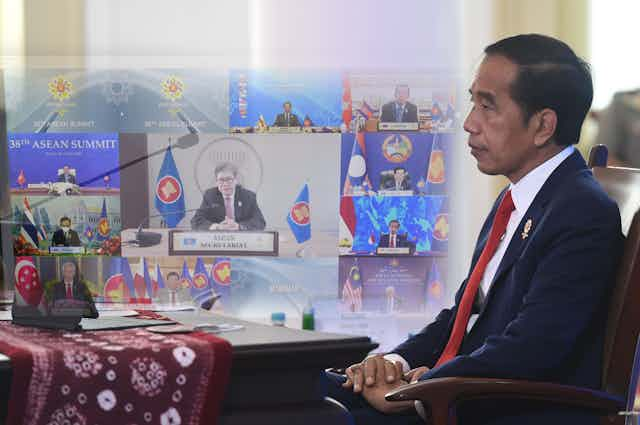Myanmar’s military leadership has violently repressed and persecuted its own people in the country since the February 2021 coup in an attempt to crack down on dissent and maintain control of the country.
With COVID-19 striking the world and Russia launching military aggression in Ukraine, international attention has shifted from Myanmar despite a year of persistent protests and civil unrest.
Indonesia, as the largest economy in Southeast Asia and the Association of Southeast Asian Nations (ASEAN) chair in 2023, needs to address the Myanmar crisis through strategic initiatives before it becomes more violent or turns into a prolonged conflict.
Myanmar can follow an Indonesian path
Indonesia’s own military reform began in 1998 after authoritarian leader Soeharto, a former general, stepped down from power.
The Indonesian military was forced to stayed out of practical politics. Its representatives were withdrawn from the parliament. Until now, if any military members wanted to run for elections, they were forced to resign from the military institution.
One important point to note is that the willingness to change came from within the military itself. A recent public opinion survey shows the military has become the most trusted institution in the country.
Many of the Indonesian military leaders are Western-educated and are exposed to democratic-civilian rules. Therefore, they have shown support to structural reform in the country.
Based on this experience, Indonesia could initiate and encourage a military-to-military engagement with Myanmar, so that Myanmar can consider the example of Indonesia’s military reform.
Such a move may change Myanmar’s mindset towards military roles and convince skeptics that having a civilian rule does not mean the military will be marginalised – instead it can be strong in a more humane way.
What Indonesia has done
Indonesia’s efforts to address Myanmar conflict come in the forms of bilateral, regional and multilateral relations. Indonesia has conducted “shuttle diplomacy” to push for a concerted effort to deal with the conflict. Foreign Affairs Minister Retno Marsudi visited Brunei, Singapore and Thailand to collect support to push for an inclusive democratic transition in Myanmar.
On a regional level, Indonesia has persuaded ASEAN members to agree on an action plan to persuade Myanmar’s Junta to conduct elections in a year’s time as promised.
Indonesia may have paid less attention to Myanmar’s crisis this year as it focuses on organising a G20 summit in Bali. But it is anticipated that the country will take more leadership on the Myanmar crisis next year as it takes on the ASEAN presidency. Indonesia could ask ASEAN countries to hold a special regional summit to further address the Myanmar crisis.
ASEAN approach towards Myanmar
Debates over how to deal with the Myanmar crisis have become a long-standing issue since 1988, when the military government came into power and Myanmar was not a member of ASEAN.
One approach is to isolate Myanmar’s military regime. Western countries and various democratic and ethnic groups in Myanmar have supported this approach.
Another approach has been to engage in an open-door policy, by encouraging investment and trade while recognising the military junta leadership to promote liberalisation. This approach, initiated by Thailand, gained support from ASEAN members because it fitted the ASEAN way of “non interference policy” in which members do not interfere each other domestic affairs and keep cooperating in the hope ASEAN engagement will help the country to gradually reform itself.
The policy adheres to ASEAN legal frameworks, such as the ASEAN Declaration 1967, Treaty of Amity and Cooperation in Southeast Asia (TAC) and ASEAN charter.
For ASEAN, this approach takes into account existing realities that may lead to political changes in a controlled and manageable manner. Many scholars have argued it managed to bring democracy back to Myanmar in 2011 – however, the military coup had brought down the civilian government in February 2021. ASEAN’s open approach may have help Myanmar returned to a civilian rule, but it is still questionable how effectively it can maintain it.
A recent development, however, shows ASEAN is no longer fully adopting this “non interference” approach. ASEAN decided not to invite Myanmar’s military junta to its 55th foreign ministers’ summit on August 3 2022 because the country did not follow a five-point consensus that has been agreed upon on democracy, good governance, respect for human rights, and constitutional government.
This development may lead to Indonesia taking a tougher stance during its presidency. It may mean Myanmar would be isolated from ASEAN activities unless it shows more progress on reaching the five point consensus.
Addressing the crisis in Myanmar will be one of the hardest challenge for Indonesia as ASEAN chair in 2023. It remains an extremely difficult path to tread, given the involvement of global powers in the region. But Indonesia needs to encourage ASEAN members to tackle the issue by applying more decisive measures.


